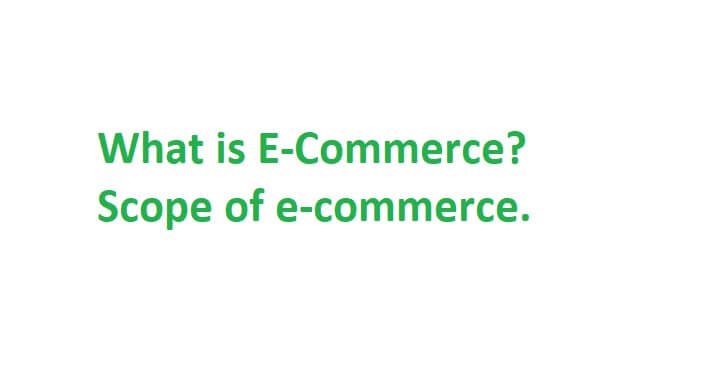in this article you will read about What is E-Commerce? Scope of e-commerce
What is E-Commerce? Scope of e-commerce
E-Commerce is buying and selling, marketing, servicing delivery and payment of products, service and information over internet, intranets, extranets and other networks, between an inter-networked enterprise and its prospects, customers suppliers and other business partners. It differs form the traditional commerce in the way that it enables the trading of goods, money and information electronically from computer to computer. Business is done electronically and there is no longer a need for physical currency or goods to conduct business.
The functions included in e-commerce are:
- Buying and selling of products.
- Shipping of products.
- Producing financial statements.
All these function are without human intervention, which is termed as real ‘E’ in e-commerce. E-Commerce is a range of online business activities that include explaining products or service and providing a mechanism for customers to buy those products and services from a websites or internet and it encompasses online shopping and online purchasing.
Scope in E-Commerce
The potential for e-commerce development is enormous. Now a days one can buy products online through some sites like Flipkart and Amazon. In the age of e-commerce everything from gym equipment to laptops are available online. E-Commerce is a super set of business cases. It includes E-trading, E-Franchising, E-Mailing, E-Engineering etc. Scope of e-commerce can be enumerated as follows:
1. Exchange of digitized information
2. Technology-enabled
3. Customers retention
4. Accounting
5. Supplier integration
6. Support the exchange
1. Exchange of digitized information: The digitized information exchange can represent communications between two parties, coordination of the flow of goods and service, or transmission of electronic orders. These exchange can be between organizations or individuals.
2.Technology-enabled: E-Commerce is about technology-enabled transactions. Web browsers are perhaps the best Know of these technology-enabled customer interfaces. However, other interfaces including automated teller machines (ATMs) also fall in the general category of e-commerce. Business once managed transactions with customers and markets strictly through human interaction; In e-commerce, such transitions can be managed using technology.
3. Customers retention: E-Commerce enables organizations to get classified and customized market information that helps in retaining customers through fast order fulfillment and effective customers relationship management (CRM). End-to-End supply chain management in e-commerce provides the opportunity the overall flow of demand and supply and results in fruitful customers retention.
4. Accounting: Financial accounting, treasury management and asset management are best possible in e-commerce because of integrated database. Financial planning and strategy determination become more convenient in e-commerce.
5. Supplier integration: For lowering inventory-carrying costs and broader availability of material and opportunities suppliers network can be integrated through EDI to implement just-in-time (JIT) inventory management.
6. Support the exchange: E-Commerce includes intra and interorganizational activities that support the exchange. The scope of e-commerce includes all electronically based intra and interorganizational activities that directly or indirectly support marketplace exchange. In this sense, we are talking about a phenomenon that affects both How business organizations relate to external parties customers, suppliers, partners, competitors, and markets and how they operate internally in managing activities, processes and systems.
You might also like:

